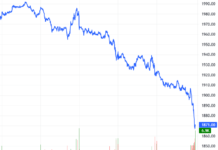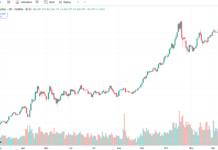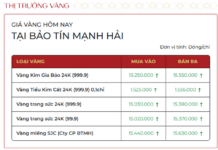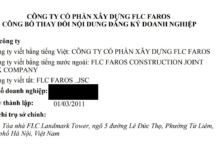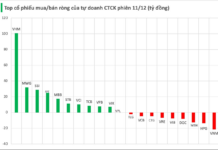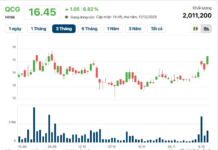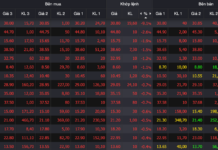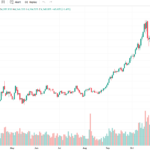The rise of e-commerce, especially the popularity of livestream shopping, has left consumers lost in a maze of products, often falling prey to counterfeit goods.
A Flood of Counterfeits
Mr. Phung Ngoc Tin from Thu Duc City, Ho Chi Minh City, shared his disappointing experience after purchasing a pair of shoes with a famous brand’s design and logo for VND280,000 through a Facebook livestream. The quality of the shoes was terrible, with stiff leather, soles, and inner lining. He could only wear them for a day or two before his feet started to hurt. “I knew they were knock-offs, but the design was attractive, and the price was a tenth of the original. The lively and confident promotion by the livestreamer convinced me to buy them. However, I was shocked by how poor the quality was, even worse than genuine shoes made by domestic brands,” Mr. Tin said.
Similarly, Ms. Ly Ly, an office worker in District 1, Ho Chi Minh City, bought a well-known French cosmetics brand’s makeup remover through a livestream by account N.L, as it was VND500,000 cheaper than in stores and came with a buy-one-get-one-free promotion. “At first, I suspected they were fake, but after interacting with the livestream, the seller assured me they were imported in bulk and being clearance-sold without the cost of rent, which explained the low price. So I decided to buy them. However, after the first use, my skin turned red and broke out in small pimples. When I checked and compared the product, it looked very similar, but when I scanned the barcode, I found it wasn’t genuine,” Ms. Ly shared.
In reality, functional forces from various localities have intervened in many cases of selling counterfeit, imitation, and unknown origin goods through livestreams.
 Livestream selling flip-flops of a global brand for just over VND100,000 per pair. Photo: LE TINH |
Recently, the Market Management Department of Ca Mau province temporarily seized approximately ten tons of goods, including clothing, bags, cosmetics, etc., of unknown origin and suspected of trademark infringement from Nguyen Mai Store, owned by Ms. NT.M (31 years old, from Ca Mau). Most of these goods were sold through livestreams.
According to the functional forces in Ca Mau, the entire livestream selling activity of Nguyen Mai Store took place on Facebook through two main accounts: Nguyen Mai Store Ca Mau with 10,000 followers and Nguyen Mai Store with 1,600 followers. Each livestream session attracted hundreds of comments and product orders. In just two days, June 17 and 18, Nguyen Mai Store’s total revenue from orders reached nearly VND600 million. The products introduced in the livestreams were mainly clothing, bags, cosmetics, and functional foods priced from a few dozen to a few hundred thousand VND each.
During the same period, the Market Management Department of Ba Ria – Vung Tau province inspected the warehouse of the owner of the Facebook account Shop Tu Uyen, belonging to Thong Uyen household business (Group 10, Phu Binh hamlet, Hoa Hiep commune, Xuyen Moc district). This account has over 134,000 followers and 80,000 likes and sells fashion items (clothing, shoes, bags, etc.) through livestreams.
The inspection discovered 1,720 assorted foreign-made products (including clothing, slippers, and bags) without origin and unclear labels in the warehouse, with an estimated total value of over VND139 million.
How to Stop It?
According to e-commerce experts, the chaotic situation of selling goods through livestreams has not been thoroughly addressed due to the ever-changing nature of this sales method. Additionally, the penalty for such violations is relatively small compared to the sellers’ profits, ranging from VND50-70 million. Most products sold through livestreams are fashion items, phone accessories, decorations, etc., with low values ranging from VND50,000 to VND250,000, and no sales invoices. Consumers who accidentally buy counterfeits rarely complain or report, so when caught, sellers usually only face administrative fines, with very few cases leading to criminal prosecution.
To prevent this situation, experts suggest that, in addition to identifying sellers and requiring them to issue electronic invoices, agencies such as the Market Management Department and the Tax Department need to coordinate to closely monitor goods and establish regulations for online sales that match the reality and have sufficient deterrence, such as increasing penalties and expanding the range of counterfeit and imitation goods commonly sold online to increase the possibility of criminal prosecution.
Speaking to the Laborer Newspaper, Mr. Pham Khac Huy, Deputy Chief of Office of the Market Management Department, said that following the Government’s and the Minister of Industry and Trade’s directions, the Market Management Department has strengthened inspection and control of violations in e-commerce and traditional commerce, discovering many violations, notably the recent case of counterfeiting the famous “Ong Cua” rice brand.
Market management forces from various localities have handled many cases related to trademark and brand infringement and quality issues. Many products advertised and displayed as genuine during livestreams or on e-commerce platforms turn out to be counterfeits or of inferior quality when received by consumers.
According to Mr. Huy, in the future, the Market Management Department will continue to strengthen the inspection of violations in traditional and electronic commerce. In particular, new technological solutions will be implemented to control and prevent violations. The Department will also organize training conferences to equip the market management forces in localities with the necessary skills and knowledge to detect and handle violating sellers.
|
Suspend Broadcasting and Report to Authorities Regarding solutions to control counterfeits on e-commerce platforms, a representative of Shopee shared that when selling products or livestreaming on Shopee Live, sellers are responsible for ensuring that their goods and livestream content comply with current laws and the platform’s policies. In addition, Shopee employs an automatic review system and a dedicated team that regularly monitors and reviews the legality of content and products on Shopee Live, promptly removing inappropriate ones. Shopee also imposes penalties on sellers who violate the rules on Shopee Live. “Depending on the severity of the violation, we apply different levels of penalties, from warnings and limiting the visibility of livestreams on the Shopee Live page to suspending live broadcasts and disabling related features. In case of serious violations, the seller will be banned from broadcasting, and the livestream feature will be permanently locked. In some cases, we also report to the competent state agency for handling in accordance with regulations. The company also provides a function to report product/content violations on Shopee in general and Shopee Live in particular, allowing users to report violations to Shopee for handling according to our policies,” Shopee said. |
Le Tinh – Thuy Linh
Lucky Shipper Wins Big During Lunar New Year
In the days leading up to Tet holiday, the amount of online shopping has significantly increased, with delivery personnel being busy on every route in Hanoi. According to an e-commerce expert, online shopping during this Tet holiday has seen a remarkable surge and is expected to continue rising in the coming period.
A multi-billion dollar industry set to enter the top 5 largest export markets in Vietnam: USA and Japan could be major clients.
The industry has the potential to reach $12 billion by 2027, making it the fifth largest export industry in Vietnam.





